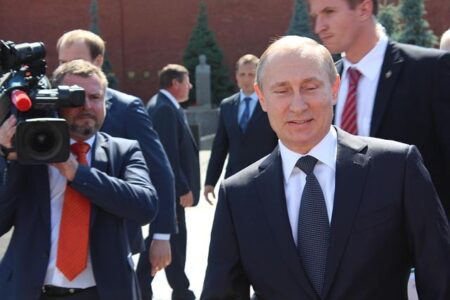In a decisive move signaling escalating tensions, former U.S. President Donald Trump’s administration has imposed stringent sanctions targeting Russian crude oil exports, triggering a dramatic 66% decline in Russia’s oil shipments to India. The unexpected sanction, described by analysts as a “crude shock,” has sent ripples through global energy markets and prompted experts to anticipate further noticeable drops in deliveries. This development underscores the widening economic impact of geopolitical strife and raises questions about the future dynamics of energy trade between Russia and key buyers like India.
Trump sanctions trigger sharp decline in Russia oil exports to India
Recent sanctions imposed by the Trump administration have resulted in a dramatic decline in Russian oil shipments to India, slashing supplies by an estimated 66% within just a few months. This decline marks a significant disruption in the energy trade dynamics between the two nations, as India had been one of the largest importers of discounted Russian crude. Industry experts highlight that these sanctions not only tighten the supply chain but also escalate geopolitical tensions, casting uncertainty over India’s energy security and pushing the country towards alternative oil suppliers.
Market analysts anticipate a noticeable drop in crude oil availability in the near term, which could impact domestic fuel prices and inflation rates. The restriction has forced Indian refiners to revise their procurement strategies, weighing options that include increased purchases from the Middle East and the US. The table below summarizes the key changes in oil imports for India post-sanctions:
| Country | Oil Imports Pre-Sanctions (Million Barrels) | Oil Imports Post-Sanctions (Million Barrels) | Change (%) |
|---|---|---|---|
| Russia | 12.8 | 4.3 | -66 |
| Middle East | 9.5 | 11.2 | +18 |
| US | 2.1 | 3.5 | +67 |
- Supply Chain Impact: Decreased Russian crude sharpens competition for alternative suppliers.
- Price Volatility: Potential rise in crude prices could affect consumer fuel costs.
- Strategic Shifts: India may accelerate diversification in oil sourcing.
Experts analyze the impact of sanctions on global energy markets and supply chains
Recent analyses reveal that the implementation of stringent sanctions on Russian oil exports has sent significant ripples through the global energy market. The abrupt 66% plunge in Russia’s crude shipments to India exemplifies broader disruptions in supply chains and pricing dynamics. Industry experts underscore that such sanctions have not only curtailed direct trade flows but also forced energy importers to scramble for alternative sources, driving up costs and increasing market volatility. The evolving scenario is challenging established supply agreements and pushing countries to reconsider their energy partnerships amidst geopolitical tensions.
The consequences of these sanctions extend beyond mere trade statistics. Experts point to several key impacts:
- Shift in global oil routes: New supply corridors are emerging as traditional pathways become restricted.
- Increased dependence on Middle Eastern producers: As Russian barrels dwindle, demand surges for OPEC and non-OPEC producers.
- Price instability: Fluctuations are expected in short to medium term as markets adjust to unpredictable supply patterns.
| Region | Oil Supply Change | Expected Impact |
|---|---|---|
| India | -66% | Supply deficit; import diversification |
| Middle East | +15% | Increased production, price influence |
| Europe | -10% | Energy security challenges |
Strategies recommended for India to diversify energy sources amid ongoing geopolitical tensions
In light of the recent dip in Russian oil shipments, experts urge India to escalate efforts in broadening its energy portfolio to shield the economy from external shocks. Key strategies include boosting domestic renewable energy production, enhancing energy efficiency, and actively pursuing alternative suppliers beyond traditional sources. Strengthening partnerships in the Middle East, Africa, and even the Americas could help mitigate risks associated with geopolitical instability. Additionally, investing in strategic petroleum reserves and modernizing refining infrastructure to handle a more diverse mix of crude oils are seen as vital steps toward energy security.
Policy experts emphasize a multi-pronged approach, prioritizing:
- Accelerated adoption of solar and wind energy to reduce reliance on fossil fuels.
- Comprehensive reforms in the power sector to improve grid resilience and integrate distributed energy resources.
- Exploration and development of domestic hydrocarbon resources where feasible, to balance imports.
- Strengthening bilateral ties with energy-rich nations, ensuring stable and affordable energy flows.
| Strategy | Expected Outcome | Timeline |
|---|---|---|
| Solar and Wind Capacity Expansion | Increase renewable share to 50% | By 2030 |
| Refinery Modernization | Enhanced crude flexibility | 2025-2027 |
| Strategic Petroleum Reserves | 3 months buffer stock | By 2024 |
| Diversified Oil Imports | Reduced dependency on Russia | Immediate to short-term |
Wrapping Up
As the fallout from sanctions continues to reshape global energy trade, the dramatic 66% decline in Russian oil shipments to India underscores the far-reaching impact of Washington’s aggressive measures. With experts anticipating a noticeable drop in supplies and shifting market dynamics, the evolving relationship between these key players will remain a critical watchpoint for international energy security and geopolitical stability.




